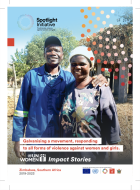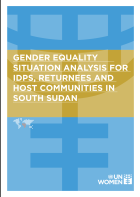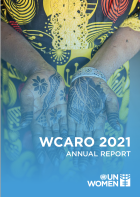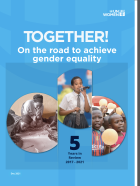1 - 17 of 17 Results
Date:
Galvanizing a movement, responding to all violence and discrimination against women and girls in Zimbabwe. After four years of programming in Zimbabwe, the EU-funded Spotlight Initiative has made milestones in ending all forms of violence and discrimination against women and girls. This story booklet captures voices of the programme beneficiaries and various stakeholders in all five programme districts across Zimbabwe.
Date:
As gaps remain in efforts to stem the tide of global economic crises, having fiscal policies in place to safeguard spending for women is essential. Gender Responsive Budgeting (GRB) can ensure a gender-equitable allocation of resources and expenditure tracking to promote gender equality. This briefing note provides information on the foundation established to determine entry points for this work, key partnerships, and plans to advance systemic financing for gender equality in the country.
Date:
2021 marked the end of the latest UN Women Strategic Plan, and during the year UN Women’s West and Central Africa Regional Office (WCARO) and Country Offices/Non-Resident Agencies continued to strengthen a comprehensive set of global norms, policies, and standards on gender equality and the empowerment of women; help end all forms of violence against women and girls; foster women’s economic empowerment; encourage and support women to lead; facilitate gender mainstreaming; and support women’s participation in peacebuilding and resilience efforts. Throughout the year, the COVID-19 pandemic continued to impact West and Central Africa, and women in the region were particularly vulnerable to the crisis.
Date:
The five years in review publication captures the progress made from 2017 to 2021 across its different focus areas: Leadership and Political Participation, Women’s Economic Empowerment, Ending Violence Against Women, Data and Statistics, HIV/AIDS and the response to the unfolding crisis caused by the COVID-19 pandemic.
Date:
The transition to a green economy will create many new jobs around the world, including in sub-Saharan Africa. But will women share-in these new jobs, and will the economic transformation help them move into higher-paid, more stable jobs that require more education and skills? The short answer is “yes” – provided countries adopt strong policies and programmes to make it happen. The green economy transition is attracting attention in policy circles but its potential gender...
Date:
This factsheet offers some insights into migrant women’s experiences in Niger, based on the limited data that is available on this topic. It was prouced as part of the Making Migration Safe for Women programme which aims to ensure that migration is safe for women migrating from, into and through Niger and that international norms and standards for protecting and promoting migrant women’s rights are strengthened. Read/Download : EN
Date:
This publication highlights findings from the Zanzibar SDGs Gender Indicators Study in the form of infographics. The infographics showcase findings from each of the sectors covered in the report namely: Poverty and Hunger, Health, Decent Work, Quality Education, Gender Equality, Key Messages and the COVID-19 Context, and Recommendations.
Date:
This Rapid Assessment, the first of its kind in Niger, aims to highlight the challenges that women may face migrating from, into and through the country. It has been developed based on a desk review of existing literature as well as information received from questionnaires completed by relevant governmental and non-governmental organizations and interviews with UN agencies and other development partners. However, the availability of comprehensive sex-disaggregated data in Niger is limited. As...
Date:
This global report provides a synthesis of the work of UN Women during 2020 to ensure a gender-sensitive response to the COVID-19 pandemic in ending violence against women, economic empowerment, leadership, gender data, and humanitarian contexts.
Date:
This series, updated quarterly, illustrates the human impact of UN Women’s work across the world, highlighting the partnerships that make this work possible. These stories share how we and our many partners are striding forward to realize a better world for women and girls
Date:
The coronavirus pandemic (also known as COVID-19) has now spread to all the 25 countries in West and Central Africa (WCA). This rapid evolution of COVID-19 in Africa is deeply worrisome. The coronavirus is a threat to the world and to all countries of our region, many of whom just recovered from the Ebola pandemic (such as Democratic Republic of Congo, Sierra Leone and Liberia). The region was already fragilized by conflict, violent extremism, and a very alarming humanitarian situation. The pandemic risks to be graver in refugee camps and IDPs camps in conflict or post-conflict areas.
Date:
This brief highlights 8 keys interventions to be considered in West and Central Africa by all sectors of society, from governments to international organizations and to civil society organizations in order to prevent and respond to violence against women and girls, at the onset, during, and after the public health crisis. It also considers the economic impact of the pandemic and itsimplications for violence against women and girls in the long-term.
Date:
The R-GTG wishes to contribute to the efforts in progress to confront the current pandemic by sharing this note with the Coordinators residing in the region with the intention of encouraging and proposing tools to improve the consideration of the gender issue in the response to COVID-19. In this respect, it addresses the main risks connected to gender when considering the pandemic and makes a specific number of recommendations to respond to it.
Date:
This note will help UN Women Country Offices in West and Central Africa, Governments and Development Partners to identify key gender impacts of the crisis to be considered when conducting socio-economic impact assessments of COVID19, in order to develop policy and programmatic actions to mitigate those impacts and to set the foundations of a recovery effort which takes into account women and girls’ needs.
Date:
As COVID-19 spreads in Africa, informal workers are hard-pressed to comply with social distancing or confinement measures, as they need to work to provide for their basic needs. Here are three things that UN Women country offices can advocate for to ensure that women working in the informal economy do not fall through the cracks in the current crisis.
Date:
The COVID-19 pandemic has profound gender implications which are likely to lead to increased inequalities. This brief highlights key areas for the integration of gender priorities and makes recommendations to governments and stakeholders for inclusion in the Nigerian national response plan.
Date:
On 25 September On 25 September2015, the United Nations General Assembly adopted the 2030 Agenda for Sustainable Development as the agreed framework for international development. It is the successor to the Millennium Development Goals (MDGs). However, unlike the MDGs, the 2030 Agenda presents a much wider scope by deliberately and more fully incorporating economic and environmental sustainability, as well as the aspiration of many countries for peaceful and inclusive societies.

















